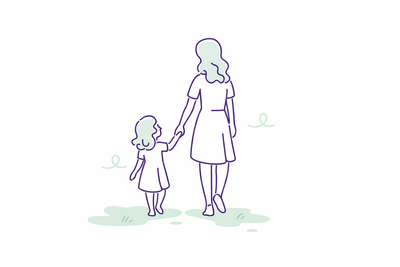
Question:
My son doesn’t want to go to football anymore, but I’ve already paid the fee for the whole year. What shall I do?
Short answer
My short answer is: forget about money, about what society thinks, about what you want and listen to your child; have empathy.
Personally, I don’t think it’s right to force our children to do an activity that they want to stop. One thing is to encourage them to try an activity they’re interested in or to continue an activity that we know they like, even though it sometimes creates resistance; a whole different thing is to force them to go to an activity they have already tried and don’t want to do anymore.
Loooong answer ;)
But it’s never all black or all white, of course, so here are some thoughts:
- I do believe that each baby (and each one of us) comes into the world with a set of preloaded unique and innate skills, interests, passions and talents: if we get to explore and develop those gifts and pursue those interests, we live more meaningful lives, and we feel more complete.
- Often we would like our children to do the activities and have the hobbies that we couldn't pursue as children (for me, it's dancing!), but maybe their interests are different. The best way to involve your children in your hobbies is to show them your own commitment: dancing is my biggest hobby, so I often asked Alex to take Oliver and Emily to watch my dance rehearsals and shows, and I often dance at home. But then I have to anyway accept that my children might not be interested at all in dancing. Actually, I believe it is always much easier and more productive for us to become passionate about their hobbies.
- If we look at our children, we can (almost) always understand what their interests are. Maybe they are not into sports like football or dancing, but their interest is more for nature and animals, which we can support by buying books, watching documentaries with them and showing we're also interested… It's a real joy for our children to see us enthusiastic about something that has captivated their interest (be it nature, Lego, drawing or football…).
- Don't lie. If your children start soccer lessons and they're not naturally good at it, don't tell them that they're "very good" or "good like their friends" to motivate them. If they don't feel good, they'll know right away you're lying to them. Be honest. You can motivate them to pursue an activity even by telling them the truth.
- Personality plays an important role: Oliver's best friend doesn't fear difficulties, if she doesn't know how to do something, she'll try and try until she succeeds. Emily is the same. Oliver is an observant and cautious child, who often refuses to do what he doesn't feel able to do or what seems difficult to him. At first I pushed him to try new things, but over time I realized that it is more important to support him and listen to him, validate his emotions and not belittle them by saying things like "Come on, it's easy!", "Look at your friend!"… if he wants, he will do it when he feels ready. This way, we don't risk turning a potential passion into a rejection.
Anecdote: It took Oliver months and months to decide to go down a slide: all his friends spent hours going up and down and he'd just sit and watch them. He'd climb and call me to help him back down the stairs. One day, out of the blue, he decided to slide down and never stopped.
- But if he never tries, how will he learn? Have you ever thought that maybe your child has no interest in learning that particular activity? ;-) I also believe that when they find something they love, they will overcome the initial barrier naturally (just like it happened with Oliver and biking). And if not, if their personality block them when faced with new experiences, we will have to patiently work with them, talk to them with empathy and respect; and we'll also have to accept that it will be something they might have to continue working on for the rest of their lives.
- Sometimes we are faced with children who love doing an activity while they are doing it, but they struggle before the activity, there's a lot of resistance and crying to get to the activity (for Oliver it sometimes happened with swimming, which he loves!). This resistance is generally only a phase, especially if you know that they enjoy the activity, but we can anyway try to help them by giving them as much control as possible when it comes to that activity: for example, with bigger children (4-5yo), we could let them decide whether to go by car or by bus (something unexpected), what swimsuit to wear, which bag to prepare, what kind of snack to take for after the lesson, and all those small decisions that make them feel more in control.
- With younger children who show resistance to new experiences (like Oliver), when starting a new paid activity it's better to choose a place where you can pay by lesson or quarter. Also, it's important to give them correct expectations and explain to them in detail what will happen, the exercises they will do, maybe even try and show them some of them at home :-)
One of my tricks to get Oliver mentally prepared is to have a handmade calendar on the fridge where days are circles that we colour in, one per day, and on the days when we go to the pool, for example, I draw water on the circle: Oliver colours a circle every morning, sees the pool day approaching and can prepare himself mentally. Oliver is a very introspective child and I noticed that this helps him, but with more anxious children it might not work… we must always observe our children. What works for us doesn't necessarily work for you.
- When the problem is not the activity itself:1. We can offer to stay with them while they do the activity (or in the case of younger children, we can to participate): this can encourage them and it can make a difference.2. If we think that the problem is that they don't feel good at an activity, we can share our experiences and feelings from when we started an activity that we weren't good at, and how we overcome the initial resistance; or we can let them talk to someone who shares their passion (or another passion) and may have had difficulty getting started.3. If we think that the problem is their friends (maybe there's some teasing involved?) it's a bit trickier, but at the beginning we can talk to them and focus on friends who are kind and help them. Even sharing a car ride to the activity with them might help.
But in motherhood, both everything and the opposite of everything are true
That said, I believe there is a huge difference between forcing our children to continue an activity, and letting them give up too quickly (especially with children like Oliver who have a tendency to give up when they feel something is too difficult).
Alex always tells me that he’d have liked if his father didn’t always accept lightly his decision to quit a hobby, and instead sometimes encouraged him more to continue.
There is always a bit of fear and insecurity when starting something new and with a child a little older (4-5 years) I think it’s worth insisting a little bit and explaining that it is only fair that we give ourselves the possibility to get past the initial fear and insecurity before giving up (because if we give ourselves enough time that initial resistance WILL pass).
I’m writing this because, although each of us has unique and innate interests that are worth pursuing, I believe that we create our own passion: the more you do something, the better you become; the better you are at it, the more you have fun; the more you enjoy yourself while doing an activity, the more passionate you become. It’s a subject that I’m very passionate about, and I wrote about it here many years ago.
A good compromise could be to decide together to do a few more lessons (2-3 months) before giving up: in this case too, I would use the help of a calendar on the fridge, a simple sheet of paper with circles on it that represent the number of lessons we still have to do before giving up. Every time we do a lesson, we color a circle (we can color good days with one color, and bad days with another, as one of my readers suggested). When all the circles are colored, we can decide whether to continue or quit, but at least we have given the activity a good go.
When doing this, of course, we always have to keep our parent antennas up and receptive, and possibly watch them (from a distance might work better) while they do the activity, and if we feel that for some reason it’s not working, just stop.
Have you ever found yourself in this situation when your children wanted to quit a hobby? What did you do?
































